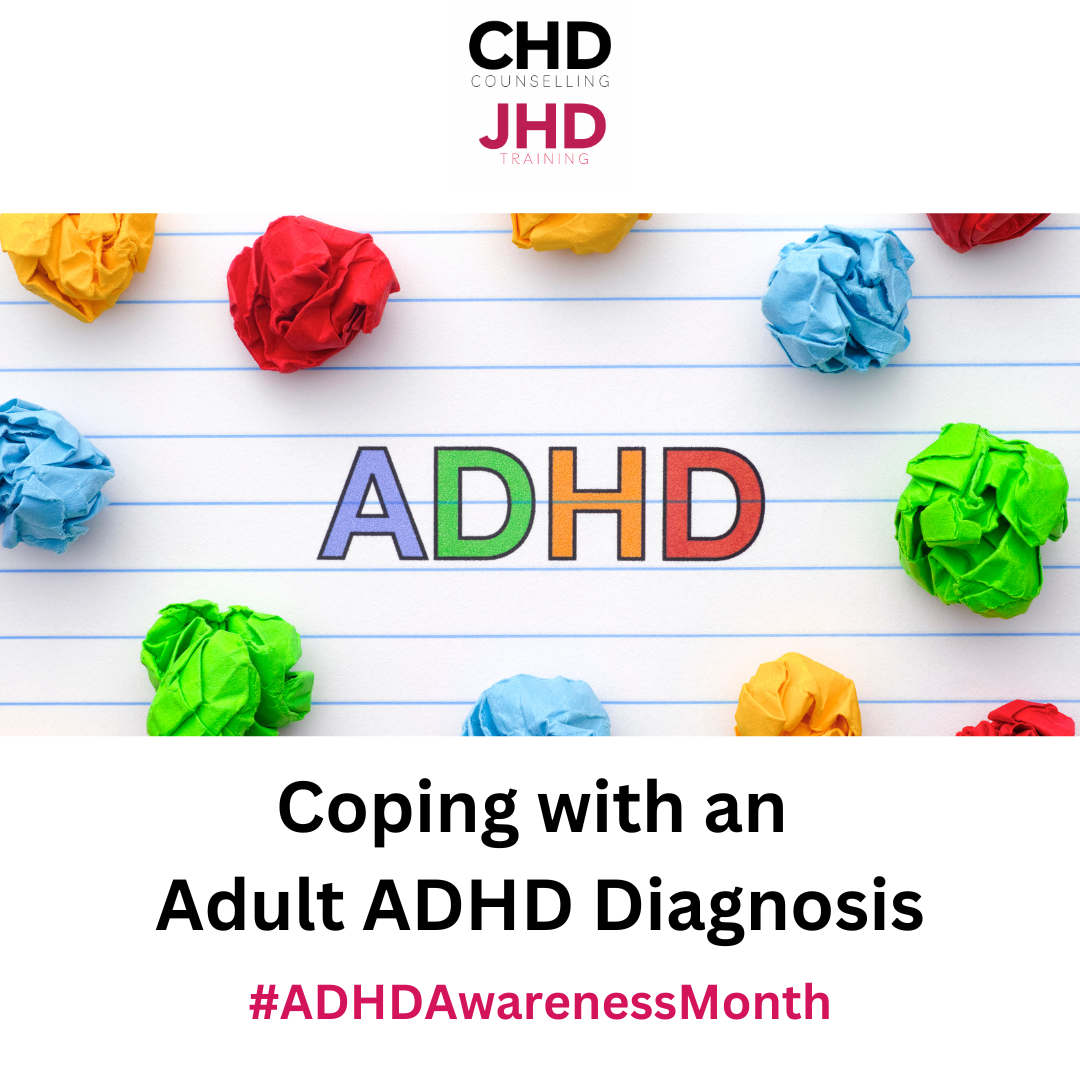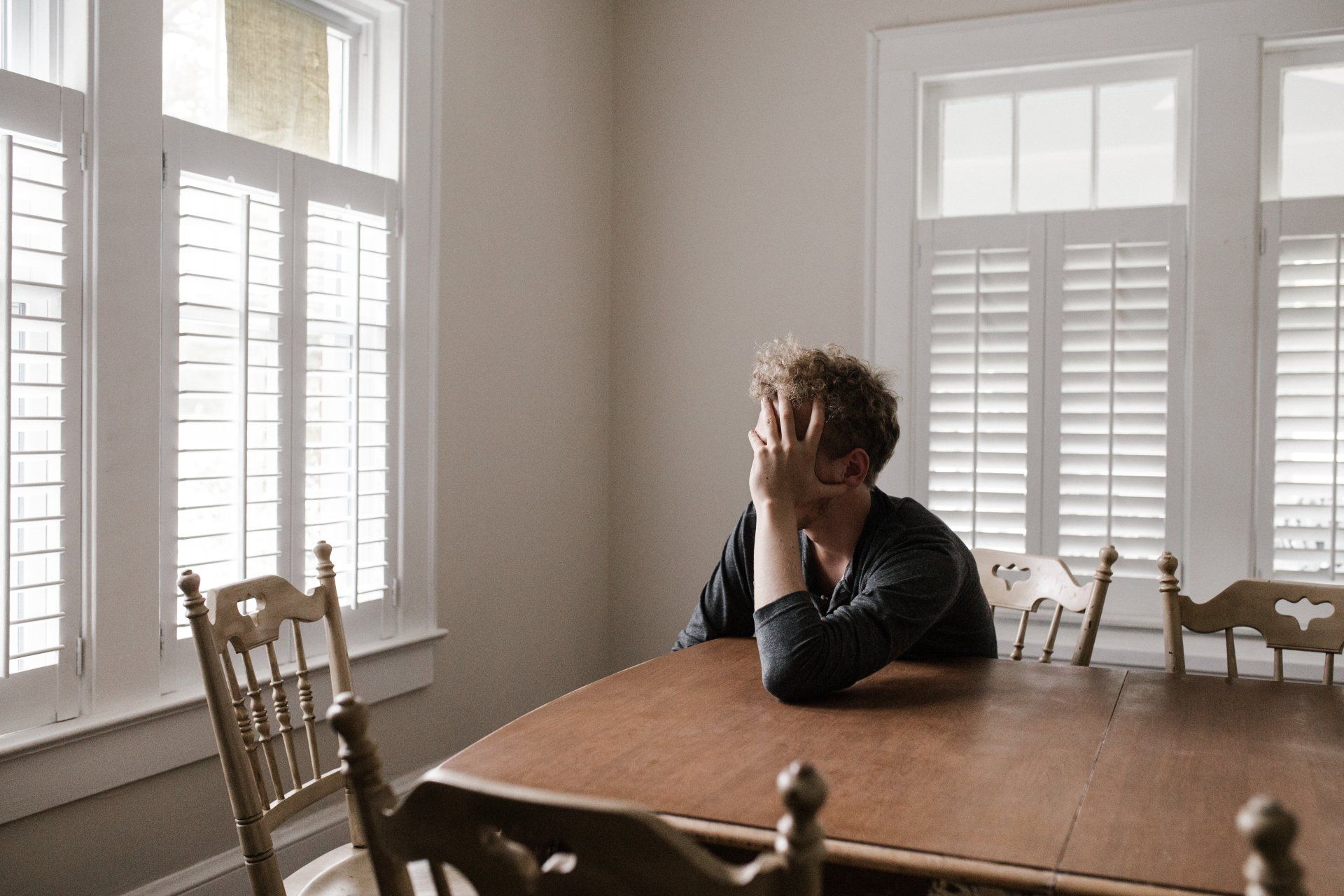JHD News

13 October 2024
Understanding Your Diagnosis Receiving an ADHD diagnosis as an adult can be a mix of relief and uncertainty. It might finally explain the challenges you've faced, but it also raises new questions. Here’s how to cope with this significant life event: 1. Educate Yourself Research ADHD: Learn about the symptoms, causes, and treatment options. This knowledge can empower you to manage your condition effectively. Join Support Groups: Connect with others who understand what you're going through. Sharing experiences can be incredibly helpful. 2. Accept and Embrace Your Diagnosis Avoid Self-Blame: ADHD is a neurodevelopmental disorder, not a personal failing. Celebrate Your Strengths: Focus on your unique talents and abilities, which can often be enhanced with the right strategies. 3. Develop Coping Mechanisms Mindfulness and Meditation: These practices can help manage stress and improve focus. Exercise: Regular physical activity can boost mood, energy, and cognitive function. Healthy Lifestyle: Prioritize a balanced diet, sufficient sleep, and stress management techniques. 4. Build a Support Network Lean on Loved Ones: Share your feelings with trusted friends and family. Seek Professional Help: A therapist can provide guidance, coping strategies, and support. 5. Explore Treatment Options Medication: Discuss medication options with your doctor. It can be a valuable tool for managing symptoms. Therapy: Cognitive-behavioral therapy (CBT) can help develop effective coping skills and strategies. Lifestyle Adjustments: Explore accommodations and strategies to help you succeed at work, school, and home. 6. Give Yourself Time Be Patient: Adjusting to a new diagnosis takes time. Be kind to yourself as you learn to navigate your experiences. Celebrate Progress: Acknowledge your achievements, no matter how small. Remember, you're not alone. Many adults with ADHD lead fulfilling lives. With the right support and strategies, you can thrive and overcome challenges. Why not schedule a consultation with JHD Counselling to see how we may be able to steer you in the right direction

11 October 2024
National Coming Out Day is a time for LGBTQ+ individuals to celebrate their identities and live authentically. However, coming out can also be a challenging experience, especially when faced with negative reactions from family and friends. If you're experiencing fallout from coming out, know that you're not alone. Many LGBTQ+ individuals face similar challenges. Here are some tips to help you cope: 1. Prioritise Your Mental Health Seek support: Reach out to friends, family members, or a therapist who is supportive of your identity. Practice self-care: Engage in activities that help you relax and de-stress, such as meditation, exercise, or spending time in nature. Join a support group: Connecting with others who have gone through similar experiences can provide valuable support and understanding. 2. Set Boundaries Communicate your needs: Clearly express your boundaries to those who are struggling to accept your identity. Limit contact: If necessary, limit your contact with individuals who are causing you significant distress. 3. Build a Support Network Connect with the LGBTQ+ community: Join local LGBTQ+ organizations or online communities to find support and a sense of belonging. Reach out to friends and family who are supportive: Spend time with people who accept and love you for who you are. 4. Focus on Your Well-being Remember your worth: Your identity is valid and valuable, regardless of others' opinions. Celebrate your journey: Acknowledge the courage it takes to come out and celebrate your progress. At JHD/CHD, our founder, Carol, is a proud member of the LGBTQ+ community. We understand firsthand the challenges that can arise when coming out. Our team of experienced counselors is dedicated to providing compassionate and supportive care to individuals who are navigating their identities. If you're struggling to cope with fallout from coming out, please don't hesitate to reach out to us. We're here to help you through this potentially difficult time.

10 October 2024
Celebrating Black History Month! We're honouring pioneering people of colour in the counselling & therapy sector. Join us as we spotlight their incredible contributions and legacies that continue to inspire! There have been numerous pioneering people of colour in the counseling and therapy sector. Their contributions have been invaluable in shaping the field and ensuring that culturally competent care is accessible to all. Here are a few notable figures: Mamie Phipps Clark and Kenneth Bancroft Clark: This husband-and-wife duo conducted groundbreaking research on the psychological effects of segregation on Black children. Their famous "doll study" played a pivotal role in the landmark Supreme Court case Brown v. Board of Education. Joseph L. White: A prominent figure in Black psychology, White founded the Association of Black Psychologists (ABPsi) in 1968. His work emphasised the importance of culturally relevant approaches to therapy. Linda James Myers: A pioneer in the field of multicultural counseling, Myers developed the Myers-Briggs Type Indicator (MBTI) for people of colour. Her work helped to address the lack of culturally appropriate assessment tools. Carl Rogers: While not a person of colour himself, Rogers' client-centered therapy approach has been influential in the development of multicultural counselling. His emphasis on empathy, unconditional positive regard, and genuineness has been adopted by many therapists working with diverse populations. These are just a few examples of the many pioneering people of color who have made significant contributions to the counseling and therapy sector. Their work has helped to dismantle systemic barriers and ensure that mental health services are accessible and culturally relevant for all.

7 October 2024
Introduction World Mental Health Day serves as a crucial reminder of the importance of mental health and the need to break down the stigma surrounding it. Mental health is just as essential as physical health, and it's okay to seek help when you're struggling. This blog post aims to shed light on mental health awareness and provide guidance on how to support yourself and others. Understanding Mental Health Mental health refers to our emotional, psychological, and social well-being. It affects how we think, feel, and act. Just like physical health, mental health can fluctuate over time. It's important to recognize that experiencing mental health challenges is common, and seeking support is a sign of strength, not weakness. Breaking Down the Stigma One of the biggest barriers to seeking help for mental health issues is the stigma associated with them. It's crucial to challenge negative stereotypes and misconceptions about mental health. By understanding that mental health conditions are treatable and that individuals who experience them are not to blame, we can create a more supportive and inclusive environment. Signs and Symptoms of Mental Health Challenges It's essential to be aware of the signs and symptoms of mental health challenges. While these can vary from person to person, some common indicators include: Emotional changes: Persistent sadness, anxiety, anger, or irritability. Behavioral changes: Difficulty concentrating, withdrawing from social activities, or changes in appetite or sleep patterns. Physical symptoms: Fatigue, headaches, or digestive problems. If you or someone you know is experiencing these symptoms, it's important to seek professional help. Seeking Support and Treatment There are many resources available to support individuals struggling with mental health. Here are some options to consider: Therapy: Talking to a therapist can provide a safe space to explore your thoughts and feelings. Medication: In some cases, medication may be helpful in managing symptoms. Support groups: Connecting with others who have similar experiences can be comforting and empowering. Self-care: Engaging in self-care activities, such as exercise, mindfulness, and hobbies, can contribute to overall well-being. Remember, seeking help is a courageous step towards healing. Supporting Others If you know someone who is struggling with their mental health, offering support can make a significant difference. Here are some ways to show empathy and compassion: Listen actively: Give your full attention and avoid interrupting. Validate their feelings: Let them know that their emotions are valid and understandable. Offer support: Encourage them to seek professional help and offer to accompany them if needed. Avoid judgment: Be non-judgmental and avoid making assumptions. Conclusion Mental health is a vital aspect of our overall well-being. By breaking down the stigma surrounding mental health and seeking support when needed, we can create a more compassionate and understanding society. Remember, you are not alone, and there is hope for healing.

25 August 2024
A Little Setback? No Problem! Feeling a bit disappointed about your GCSE results? Don't worry, you're not alone. It's totally normal to have high expectations and feel a bit down when things don't go exactly as planned. But remember, these results don't define you, and there are plenty of paths to success. Here are a few things to keep in mind: You're not alone. Many students experience similar feelings after receiving their GCSE results. It's important to know that you're not the only one going through this. Your results don't define you. Your grades are just one aspect of who you are. There are many other qualities that make you a valuable individual. There are many paths to success. A traditional university path isn't the only way to achieve your goals. There are plenty of other options, such as apprenticeships, vocational training, or gap years. Talk to someone. Don't bottle up your feelings. Talking to a friend, family member, teacher, or counselor can help you process your emotions and find support. What can you do next? Take a break. Give yourself some time to relax and recharge. Reassess your goals. Think about what you really want to achieve and how you can get there. Explore your options. Research different paths that align with your interests and skills. Seek advice. Talk to teachers, counselors, or parents for guidance and support. Focus on your strengths. Identify your areas of expertise and build on them. Remember, this is just a temporary setback. With the right mindset and support, you can overcome this challenge and achieve your goals. Keep your head up and don't give up on your dreams.

15 August 2024
Exam results day can be a stressful time for students, especially if they don't get the grades they were hoping for. It's important to remember that you're not alone, and there are ways to cope with disappointment and move forward. Here are some tips on how to cope if you don't receive the exam results you were hoping for: Allow yourself to feel your emotions. It's okay to be disappointed, angry, or upset. Don't try to bottle up your emotions, as this will only make things worse. Allow yourself to feel whatever you're feeling, and then let it go. Talk to someone you trust. Talk to your parents, friends, teachers, or a counselor. Talking about how you're feeling can help you to process your emotions and start to feel better. Take some time for yourself. Do something that you enjoy and that will help you to relax. This could be reading, listening to music, going for a walk, or spending time with loved ones. Don't make any rash decisions. Don't make any decisions about your future right away. Take some time to think things through and to explore all of your options. Remember that you're not defined by your exam results. Your exam results are just one part of who you are. They don't define your worth or your potential. Here are some additional tips for students who are feeling disappointed with their exam results: Find out what went wrong. Talk to your teacher or tutor to get feedback on your exams. This will help you to understand where you went wrong and what you need to do to improve your grades. Consider resits or clearing. If you didn't get the grades you need for your chosen university course, you may be able to resit your exams or apply through clearing. Look for alternative pathways. There are many other ways to achieve your goals, even if you didn't get the grades you were hoping for. You could consider taking a gap year, doing an apprenticeship, or studying a different course at university. It's important to remember that you're not alone and that there are many options available to you. Don't give up on your dreams just because you didn't get the exam results you were hoping for. With hard work and determination, you can still achieve your goals.

11 June 2024
This Loneliness Awareness Week at JHD Counselling, we want to focus on you, the amazing parents who want to support your child through feelings of loneliness. It can be heartbreaking to see your child feeling isolated, but know this: you're not alone, and there are ways to help them connect. Understanding Loneliness in Children Loneliness isn't just about being physically alone. It's about feeling a lack of connection with others. This can happen for many reasons, from new friendships taking time to develop to a recent move or change in routine. Spotting the Signs of Loneliness Here are some signs your child might be feeling lonely: Withdrawal from activities they used to enjoy. Changes in mood or appetite. Difficulty making or keeping friends. Seeming clingy or needing constant reassurance. Building Bridges of Connection: There's so much you can do to help your child feel more connected: Open Communication: Create a safe space for your child to talk about their feelings without judgement. Quality Time: Put away distractions and focus on shared activities your child enjoys. Encourage Exploration: Help them find after-school clubs or activities based on their interests. Social Skills Support: Role-play greetings, conversation starters, and conflict resolution to build confidence in social situations. Celebrate Efforts: Acknowledge even small steps your child takes towards making friends. At JHD Counselling, we understand that navigating your child's social world can be challenging. Our experienced counsellors can offer support in several ways: Individual Therapy: Help your child explore their feelings, develop coping mechanisms for loneliness, and build social skills. Family Therapy: We can guide open communication within the family to foster a supportive environment. Parent Consultations: Equip you with tools and strategies to address your child's specific needs. Loneliness Awareness Week is a reminder that connection is vital for everyone. If you're concerned about your child's loneliness, JHD Counselling is here to help. Contact us to discuss how we can support your child on their journey to feeling more connected. Together, let's build a world where no child feels like an island.

11 June 2024
Loneliness. It's a word that can carry a heavy weight, conjuring images of isolation and disconnection. This Loneliness Awareness Week at JHD Counselling, we want to acknowledge this very real experience and offer a message of hope: you don't have to face loneliness alone. The Grip of Loneliness Loneliness can strike anyone, regardless of age, background, or circumstance. It can be particularly acute in a bustling city like London, where surrounded by people doesn't necessarily translate to feeling connected. The constant stream of social media updates portraying seemingly perfect lives can further fuel feelings of isolation. Taking the First Steps Out of Loneliness The good news is, there are steps you can take to break free from the grip of loneliness. Here are a few tips to get you started: Acknowledge your feelings: Don't brush aside your loneliness. Ignoring it won't make it disappear. Allow yourself to feel it, and recognise that it's a common human experience. Reach out: This is the most crucial step, but often the most daunting. Connect with a friend, family member, or neighbour. Join a local club or group based on your interests. Small acts of connection can make a big difference. Seek professional help: If loneliness feels overwhelming and you're struggling to cope, consider talking to a counsellor. A therapist at JHD Counselling can provide a safe, supportive space to explore your feelings and develop strategies to build stronger connections. JHD Counselling: Here for You At JHD Counselling, we understand the impact loneliness can have on your mental and emotional wellbeing. Our team of qualified and experienced counsellors can help you explore the root causes of your loneliness and develop coping mechanisms. We offer a variety of therapy approaches to find the best fit for your individual needs. Loneliness Awareness Week is a time to break the silence. Don't suffer in isolation. Take the first step towards connection and reach out to JHD Counselling today. We're here to listen and support you on your journey towards feeling less alone. Contact us to discuss how counselling can help you overcome loneliness and build a more fulfilling life.

2 April 2024
Public speaking. Two words that can strike fear into the hearts of even the most confident among us. But fear not, fellow travellers on the path to powerful communication! Overcoming your fear of public speaking is absolutely possible, and the rewards are immense. Here, we'll break down some actionable steps to help you transform from a nervous wreck to a captivating speaker: Preparation is Key: Know your stuff: Confidence comes from feeling prepared. Deeply understand your topic and rehearse your speech thoroughly. Structure your talk: Craft a clear and concise message with a strong opening, engaging body, and impactful conclusion. Practice, practice, practice: Rehearse out loud, in front of a mirror, or for a supportive friend or family member. Shift Your Focus: From yourself to your audience: What value are you bringing them? Focus on delivering a message that resonates. From perfection to connection: Everyone makes mistakes. Aim to connect with your audience, not be flawless. Reframe nervousness as excitement: Channel your nervous energy into enthusiasm for your topic. Taming the Jitters: Breathe deeply: Slow, controlled breaths will calm your nerves and steady your voice. Visualize success: Imagine yourself delivering a confident and engaging speech. Positive self-talk: Replace negative thoughts with affirmations like "I am prepared" and "I have something valuable to share." Bonus Tip: Embrace the Power of Practice: Public speaking is a skill that improves with experience. Join a public speaking group like Toastmasters or volunteer for presentations at work. The more you speak, the more comfortable you'll become. Remember, everyone feels some nervousness before speaking publicly. But with the right preparation, a positive mindset, and a little practice, you can transform your fear into a force for powerful communication. So, take a deep breath, step up to the mic, and share your voice with the world!
LOOK AROUND
CONTACT US
Counselling enquiries
admin@jhdcounselling.co.uk
+44 7811 794203
Training enquiries
secretary@jhdcounselling.co.uk
FOLLOW US
© 2025
JHD Counselling LTD

